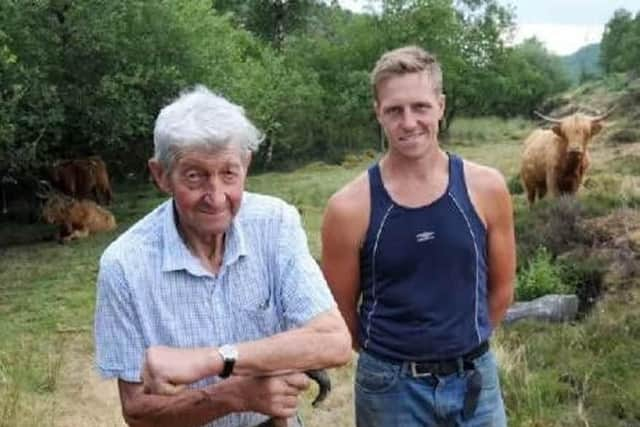Peak District farmer “sick” of people hugging Highland cows for an “Instagram photo”
and live on Freeview channel 276
Alex Birch, 37, who runs Gorse Bank Farm where the cows graze, says he has reached the end of his tether with scores of smartphone-clutching visitors taking selfies with the large animals.
The cattle roam on moorland at Baslow Edge and have become something of a tourist attraction in recent years, drawing visitors from across the country.
Advertisement
Hide AdAdvertisement
Hide AdTourists are regularly seen taking pictures of themselves with the striking looking animals in the background – something which has increased to what Alex says is an unmanageable level since the pandemic.


The shaggy cows even have their own Facebook and Instagram pages – which is something the 37-year-old farmer now says has to stop.
Last week Facebook group Highland Cows of the Peak posted a request from Alex that admirers give the animals a “break” from social media to “ensure their safety”.
It comes after a member of the public called the RSPCA reporting that one of the cows was injured.
Advertisement
Hide AdAdvertisement
Hide AdFather-of-two Alex said: "Somebody rang the RSPCA and claimed anonymously that there was an injured one, with a cut foot. I went and treated it on Monday morning, bearing in mind these are obviously wild and things happen.
"On Tuesday RSPCA came and wanted to go through all my records. It doesn’t sit well with me because if someone has got something to say they should approach me."
Speaking about visiting members of the public, Alex said: “I’ve just had enough. I voluntarily let people post all the time about the cows and at the end of the day they can do what they want as they have right to roam.
"But I’m just sick of it. People running groups on social media are creating a tourist attraction off of my cows. It’s led to this ridiculous following and I don’t want it, I don’t want to know. I just want the cows to be left alone.
Advertisement
Hide AdAdvertisement
Hide Ad"It’ll lead to something because people are up there all the time, cuddling the damn things – they actually do. I’ve had to stop young girls from having their arms around their necks – it’s a 500 kg animal that isn’t tame, it’s not a dog.
"But they don’t care – they want to try and get an Instagram photo. I had a yoga instructor from London filming them and she’s doing the bloody headstand in the middle of them.
"I’m like, seriously love, where’s the brain you were born with?”
Gorse Bank has about 400 sheep and 450 cattle and is farmed by Alex, his grandfather David Thorp, 84, a full-time apprentice and another part-time worker.
Advertisement
Hide AdAdvertisement
Hide AdAlex works seven days a week from 6am until around 2am and estimates his hourly rate would be between £4 and £5 an hour.
The Highland herd – left to breed naturally for generations – has been in the family for decades and was first brought to the moorland by Alex's great-grandfather.
There are now only 10 of the animals left following an incident in 2019 which led to the slaughter of half of the herd.
A dogwalker had complained to the Health and Safety Executive that a cow “approached him and pinned him against a wall’.
Advertisement
Hide AdAdvertisement
Hide AdAlex keeps the herd as part of an agreement with Natural England and is obligated to have around 16 on the moorland at Baslow Edge.
The Highland cows, though not profitable as a herd, have grazing habits that allow rarer and more fragile plant species to thrive.
They are one of a few ways by which Alex and his family is able to collect an environmental Government subsidy to support the farm in ever more challenging market conditions.
Alex added: “They’re not a good cow commercially. But we have the land and have to do something with it.
"Everything has to be managed and we have to abide by environmental regulations.”
